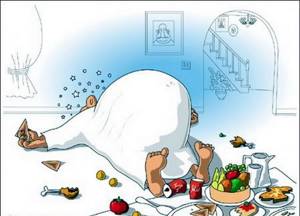Intermittent fasting
The most popular technique today, it is also called fasting. This is periodic fasting, which is considered the most comfortable for the human body. It is believed that regular but relatively short fasting is a kind of shake-up for the body, helping to launch anti-inflammatory processes and improve metabolism. There are several variations of fasting:
16/8
This is a refusal to eat for 16 hours. A fasting person can choose an 8-hour “eating window” during which they can eat as usual. Once this period expires, only clean water is allowed to drink. It is believed that in 16 hours the body has time to rest and recharge for a new job. It is also desirable that the “eating window” be regular. That is, if you have breakfast at 9 am, then have dinner at 17:00. No more, no more, and so on - every day.
Advanced fasters move from the 16/8 system to one-day, two-day and even three-day fasting. In Silicon Valley, by the way, more and more employees are switching to intermittent fasting. But not for losing weight, but for increasing activity.
Among the enthusiasts of this type of nutrition is Phil Lubin, the former CEO of the large company Evernote and the current one of the All Turtles studio. He practices fasting from 2 to 8 days, claiming that during this period he feels reborn:
A mild euphoria sets in. My mood and concentration improve and I feel a constant flow of energy. I feel much healthier. It helps me become a better leader. Mastering this practice is definitely one of the two or three best things I've done in my entire life.
Of course, like any fasting, the 16/8 method is contraindicated for people with certain diseases. Thus, intermittent fasting is contraindicated for those who have gastritis, problems with the gallbladder, adrenal glands, as well as pregnant and breastfeeding women.
I’ve been practicing intermittent fasting for a year now: my skin and digestion have become better, my stomach doesn’t growl at night like before,” says Petrozavodsk resident Asya, who wished to remain anonymous. — In the morning, before the “opening” of the eating window, you don’t want to eat at all. However, there is a great temptation to eat all the time allowed. Sometimes I can’t stop stuffing food into myself for future use, I’m working on it.
One-day fasting

It is recommended to start this type of fasting in the evening. Around 6 p.m. you should have dinner—just eat as usual, without overeating “in reserve”—and go to bed. The next day, the diet consists of only water. You can drink it without restrictions. Thus, you will live without eating for about 36 hours - this is enough to “shake up” the body and give it a break from constantly processing food. The next morning, it is not recommended to immediately run to the refrigerator. Adherents of one-day fasting advise lying down, listening to your feelings, and then just having a light snack. It is advised to start the day with a vegetable salad or an apple: they will pass through the intestines and, like a brush, clean out the remaining food from it. At the same time, getting out of bed on this day should be smooth: if you are not used to it, you may feel dizzy from fasting.
A Petrozavodsk resident instagram.com/maasparas practiced one-day fasting one winter:
Yes, I successfully fasted. I started with a one-day fast, chose Monday for this: the last meal was on Sunday evening, and the next one only on Tuesday morning. I spent in this mode from December 2016 to March 2017, that is, the whole winter. I had workouts on Mondays, so I also ran for an hour and a half on fasting days. What changes did you feel? Only positive ones. At first you realize that without food is normal. It is not needed in the quantities we consume, and even more so in the often poor quality that is offered to us. Taste preferences begin to change: once a week the body refuses the so-called “food drugs” (salt, monosodium glutamate and other unnecessary components) and gradually rebuilds itself. You begin to think: it’s normal, then why eat all these sauces, marinades, fried foods, etc.? And when you fast for three days, you feel more psychological stress: just on the third day, weakness appears, which soon disappears, because at this time the body switches to using its own resources. Therefore, it is at this time that we lose weight, toxins come out of us, and the intestines are cleansed. The appearance these days, of course, is not very good: acidification of the body begins sharply, white deposits appear on the tongue, an odor may appear from the body - it is just getting rid of all internal debris. The best advice at this time is to train more, and after training, relax, sleep, be near the water, in nature. In a word, therapeutic fasting is the norm, an invaluable experience, a cool psychological practice. After such an experiment, you look at the world differently. It turns out that it is not material values in the form of new iPhones and other things that are important, but fruitful interaction with yourself and the people who are important to you and understand you.
results
- in five days my weight dropped from 74.5 kg to 66.4 kg, that is, I lost 8 kg 100 grams;
- according to my wife’s observation, the color of my teeth has improved, they have become whiter;
- when I started doing exercises after finishing the fast, I noticed that my stretching itself had improved significantly;
- For the following detail, I apologize in advance, since it will not be very pleasant to read about it; on the third day of fasting, when I coughed heavily, two pea-sized pieces of some substance flew out of my throat.
Their texture was like pieces of hard cheese, but they had one distinctive feature - they smelled very unpleasant, or rather, terrible, they just stank disgustingly!
Now it has become clearly clear to me what waste products are in the body and why people’s breath may not smell fresh in the morning.
And if such rubbish is located inside, on the walls of the esophagus, then no toothpastes or rinses will help, it is necessary to cleanse the body from the inside.
When I decided to go on dry fasting, I set myself a couple of goals that I wanted to achieve, but at the moment I’m not ready to tell you whether I was able to do it or not. Perhaps later I will share my thoughts on this topic.
Field Bragg technique
American doctor Paul Bragg fasted every week for 24 to 36 hours at intervals of 7-10 days, drinking only distilled water. At the same time, the man was actively moving and taking walks in the fresh air. Bragg looked great and was in excellent athletic shape even in his old age.
Bragg advised starting with a three-day fast in conditions of complete calm. These days you may feel slightly dizzy, so you need to make sure you can lie down in advance. Also during this period it is not recommended to watch TV, read, listen to the radio or talk on the phone. It is necessary to exclude physical activity and, if necessary, not even leave the house, sleep more. At the same time, Bragg did not recommend using enemas, calling it unnatural:
I don’t believe in any kind of violence against nature, and the use of enemas, in my opinion, is mostly unnatural. The same applies to taking any type of laxative. The intestines have their own sanitary and antiseptic agents, and the remaining food that was in the intestines before the fast begins will be neutralized before the end of the fast. The excretory system of nature is perfect if its natural work is not interfered with. When you finish your fast, start eating foods that are well-balanced in volume, moisture, and viscosity. And you will see that your intestines will begin to work better than ever because at least fifty percent of your diet has become natural, consisting of raw fruits and vegetables in the form of salads. Eat more greens and vegetables. Meat and fish should not be eaten more than three times a week. The need for proteins will be satisfied through nuts, seeds and vegetables. The bread you eat should be dried until the starch turns into sugar, which is easily digestible. After fasting, it is good to eat sprouted wheat grains - this is a very healthy food.
Bragg died at the age of 95 from a windsurfing accident. According to legend, when pathologists opened his body, they found organs like those of a young man.
Advantages and disadvantages

At first glance, a water diet seems ideal. But you just have to try it on yourself, and by the end of the first day you will fully recognize all its shortcomings. It is better to prepare for them in advance.
pros
- There is no need to stand at the stove all day and frantically search for suitable recipes;
- no need to count calories;
- it is not at all necessary to increase physical activity (optional and depending on the severity of the chosen option);
- saving money: the diet does not involve eating exotic foods, for which you have to pay half your salary;
- relative safety for health;
- does not cause allergies;
- perfectly suppresses the feeling of hunger;
- gives a feeling of lightness and weightlessness.
Minuses
- Side effects ranging from a slight headache to nausea after each glass;
- the feeling of fullness passes very quickly, so you still can’t escape hunger;
- difficult to tolerate;
- leaching of nutrients (especially potassium and calcium);
- frequent visits to the toilet.
So, think 100 times, weigh the pros and cons, analyze the possible side effects. If you are confident in your abilities, it’s time to get to know the system better.
Dry fasting

It is believed that the advantage of dry fasting over the standard method of water fasting is that in more severe conditions the body has to more actively break down its own fats and destroy pathological tissues. This is obviously a more stringent procedure, which puts a lot of stress on the human psyche: you need to fast without water (even water procedures) and food. Dry fasting is dangerous for a beginner, and at home it is not recommended to do this for more than 2-3 days.
Just today I’m going on a dry fast all day until tomorrow morning,” says Petrozavodsk resident Nika Yagmur. — I practice dry fasting 1-2 times a month, but I want to increase the number of days to four per month. If you don’t drink, a powerful cleansing process will start after two skipped meals (this is somewhere in the middle of the day), if you fast on water, it takes three days. In addition, water turns on the digestion process, and at the end of the day many people are often very hungry. Therefore, dry fasting is more effective. But there are many nuances. For dry fasting, you need to stick to a vegetarian diet for some time, otherwise a powerful release of toxins may begin and you will get sick. In addition, it is necessary that the person has healthy kidneys. If there are any health problems, it is better to start fasting with water. Everything should happen gradually, without sudden changes, otherwise it can cause harm.

How much weight can you lose in 5 days?
On average, you can lose from 5 to 10 kg on a 5-day diet, it depends on the initial weight and constitution of the person. To achieve maximum results, to become beautiful and slim, you should start moving more, doing morning exercises, and simple physical exercises. If there are no problems with the cardiovascular system, daily cardio training is welcome. Intense strength training will help you get rid of a few more kilos of fat and tighten your body. It is possible to lose 5 kg in 5 days, but you need to approach everything wisely.












